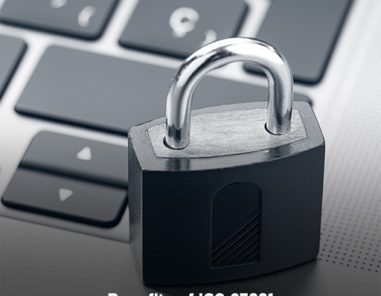
7 Benefits of ISO 27001 Certification
The ISO 27001 standard is an international, auditable and comprehensive stand...
Read MoreIt is commonly believed that completing the ISO 27001 lead auditor course is all it takes to become adept at auditing. This is not entirely true. This article will explain the steps you need to take if you want to work as an ISO 27001 lead auditor, covering topics such as ISO 27001 auditor training and the certification process. You can easily implement ISO 27001 certification by using ISO consulting services.
The ISO 27001 is a widely used standard that focuses on information security management. Through the implementation of an Information Security Management System (ISMS), the standard provides a framework of policies and procedures including legal, physical and technical controls that helps an organisation effectively evaluate their risk management processes. We have already provided complete information about this standard in the article What is ISO 27001?

There are two types of auditor training available. The internal auditor training is generally a two-day program, and the lead auditor training is usually a five-day program. Both types of training are based on the recommendations outlined in ISO 19011: 2018 guidelines, terminology and concepts.
Examples of these concepts include learning how to plan audits, learning to select the audit team, initiating the audit and conducting opening meetings. Both the lead auditor and internal auditor training programmes cover the topics of ISO 27001 in detail. Individuals who undergo the training will learn how to perform the entire audit process, from planning and audit program to reporting the audit results.
Therefore, the ISO 27001 people who undergo the auditor training learn how to apply auditing techniques as per the ISO 27001 recommendations and the controls outlined in Annex A. We suggest you read ISO 27001 auditor training article to get more information.
However, there are many differences between internal and lead auditor training. The ISO 27001 lead auditor training requires candidates to learn communication techniques, understand audit team responsibilities and conduct on-site activities. Additionally, in the on-site activities, candidates are also taught how to investigate and identify findings. The training program’s last section includes preparation, conducting close meetings, and understanding reporting audit techniques. The ISO 27001 requirements article is a good source for more information.

Passing the exams to finish the auditor training and receiving your certification does not mean that you can go and conduct audits. ISO 27001 auditors certification is just a starting point for working as an auditor. If you are interested in becoming an ISO 27001 lead auditor, there are certain steps that you need to follow.
If you wish to become an ISO lead auditor, here are the steps outlined in ISO 27001 certification, a standard that defines the requirements for certification bodies:
To obtain the certificate, you must attend the course of the ISO 27001 lead audit and pass the exams. The course lasts five days, and on the fifth day, you need to clear a written exam. Hence, it is necessary to invest considerable effort, not only by studying for the exams but also by attending the full duration of the course. If you miss even a single day, you may not be permitted to take the exams.
In order to work as a lead auditor, you need to gain four years or above experience in information technology, out of which, two years must be in a job related to information security.
You need to find a certification body that is looking for an ISO 27001 certification auditor. Although, this may prove to be a stressful task, since most of the certification bodies already have their auditors, finding a body would allow you to go through their training.

When you find a certification body that is interested, it still doesn’t guarantee that you will start auditing tomorrow. The ISO 27001 requires individuals to go through a training program similar to the one they attend during the certification audit. However, the difference is that this training program is conducted by experienced colleagues where you will learn how to perform audits.
This training program will include many case studies, especially the ones that the certification body has implemented. Usually, such training programs last for twenty days. After which, you will be entitled to perform and ISMS audit, not as the lead auditor, but as a part of the audit team.
To become an ISO 27001 lead auditor means that you have to now lead a team of auditors performing the audit. This requires you to have the experience of at least three complete ISMS audits.
As a lead auditor, your roles and responsibilities would include system implementation as per policies and procedures. Additionally, you need to conduct risk assessments to identify residual risks.
The roles and responsibilities also involve implementing corrective actions. These actions promote quality throughout the organisation by ensuring processes are following the PDCA cycle and are in line with the legal requirements.
An added responsibility is to work in liaison with the certification body to update the system and stay current with new requirements and developments in the field.
ISO certification gives your organisation a competitive edge. By helping you increase operational efficiency and overall product consistency, your business credibility and authority will soar to new heights.

Copyright © 2025 The ISO Council | Privacy Policy